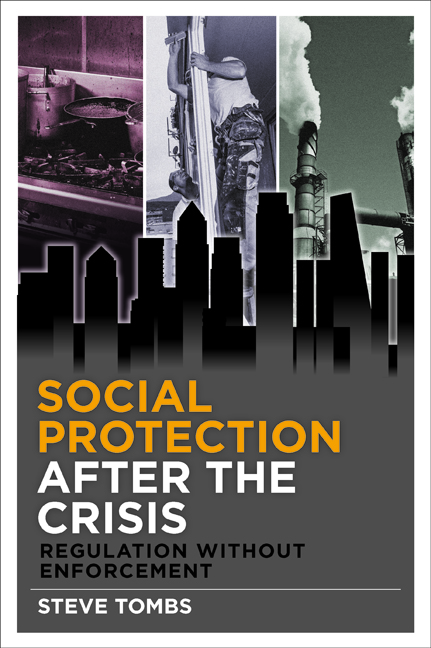Book contents
- Frontmatter
- Contents
- List of tables and figures
- About the author
- Acknowledgements
- one Introduction: some starting points
- two The new material and moral saliences of private capital
- three Framing the crisis: moral critique and the renewal of ‘business as usual’
- four Regulation, orthodoxy and hegemony: crisis, what crisis?
- five Re-regulation in action: ‘Better Regulation’
- six Regulatory inaction? Regulation without enforcement
- seven After regulation?
- Notes
- References
- Index
one - Introduction: some starting points
Published online by Cambridge University Press: 01 September 2022
- Frontmatter
- Contents
- List of tables and figures
- About the author
- Acknowledgements
- one Introduction: some starting points
- two The new material and moral saliences of private capital
- three Framing the crisis: moral critique and the renewal of ‘business as usual’
- four Regulation, orthodoxy and hegemony: crisis, what crisis?
- five Re-regulation in action: ‘Better Regulation’
- six Regulatory inaction? Regulation without enforcement
- seven After regulation?
- Notes
- References
- Index
Summary
Capitalist Society faces a dilemma, either an advance to socialism or a reversion to barbarism. (Rosa Luxemburg, 1916, The Junius Pamphlet, in Waters, 1970, 269)
Introduction
In August 1914, the German SPD – the ‘great shining jewel of the Second International’ (Waters, 1970, 257) – voted in favour of funding Germany's participation in the great imperialist war of 1914–18. For Rosa Luxemburg, and other revolutionary socialists, it marked the end of parliamentary social democracy. For her opposition both to the war itself and to the SPD for supporting the war, Rosa Luxemburg was imprisoned. From her cell, she wrote the pamphlet, The Crisis of German Social Democracy, widely known as The Junius Pamphlet. Probably mis-quoting Engels, she marked this watershed as one of a descent into barbarism or a turn to socialism.
One hundred years later, few in the west are writing of socialism, but many are facing something akin to barbarism. If the almost 40 years of neoliberalism have undone much of what Alain Supiot labelled the ‘social state’, on which more below, the flexibility, tenacity and sheer power bases of this form of political economy, which discursively counterposes states and markets, with the avowed aim of setting the latter free of the former, has come out fighting after what some thought might have been the sucker punch of the financial crises which unfolded across the globe from late 2007 onwards.
While ‘barbarism’ has a multiplicity of meanings within Marx's and Marxist thought (Bellamy-Foster and Foster, 2004), the barbarism of the current era is regressive – an attempt by a ruling class to restore any losses sustained through the peculiar hiatus of post-war social democracy, which one commentator has called the breaking up of ‘capitalism's shotgun marriage with democracy’ (Streeck, 2014, 64). In this, the creation of a new hegemonic common sense about the extent of possibilities and necessities in the world appears to have been remarkably successful. One generalised response to the current international recession – and claims of ‘sovereign’ indebtedness – has seen governments roll out severe austerity measures: widespread social harm measured in rising rates of un- and under-employment, decreases in the social wage, and increasing levels of poverty and inequality have been accompanied by further anti- and de-regulatory pressures in order to ‘free’ private capital to produce wealth, employment and tax revenues.
- Type
- Chapter
- Information
- Social Protection after the CrisisRegulation without Enforcement, pp. 1 - 32Publisher: Bristol University PressPrint publication year: 2015



